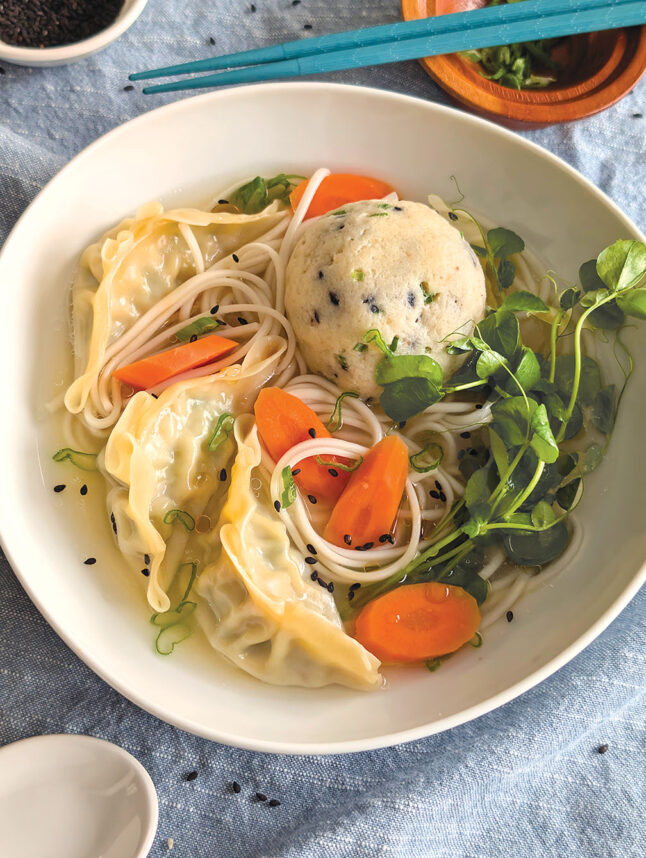
Marisa Baggett blends tradition, identity and intention in her culinary work.
“My sushi journey and my Jewish journeys are actually very much entwined,” Baggett, a black Jewish sushi chef, told the Journal. “When I was going through sushi school, I was also embracing Judaism, so there was always this kind of… pull between how I’m going to show up as a Jewish sushi chef: the issues of Kashrut and … am I gonna work Friday nights? All of these things.”
Baggett, who once owned a kosher deli, has brought her Japanese training into her Jewish food. Within the past year or so, she decided to focus mostly on plant-based and plant-forward food. After all, when you are catering a bar mitzvah, you can’t just make the same two or three sushi rolls.
“Because of the boundaries that I had to work within, I started getting very creative with plants,” she said. “And I fell very much in love with making sushi that was vegetarian.”
Baggett, who originally thought her culinary career would be cake design, came to sushi out of the blue.
A client walked into her bistro in Mississippi and asked her to cater a party with sushi. She said ‘Yes, let’s do it,’ without ever having tasted sushi. This was before sushi — and sushi bars — were everywhere, including small towns like the one she grew up in.
Baggett went to the library, got a lot of Japanese cookbooks, figured out how to make the rice from a recipe and got creative.
“What I didn’t know at the time is that sushi wasn’t really one of those creative things,” she said. “People went to sushi bars to get the things that they like to get.”
Her sushi was a hit, so she kept at it!
“I was having the time of my life,” said Baggett. This was early in her career. “People are telling me it’s cool; I don’t really know because I still haven’t had a chance to go to a sushi bar.”
The moment everything changed was when someone from a nearby town — one that actually had a sushi bar — called to make reservations, and wanted to make sure they would have sushi.
On that night, a man walked in, followed by 12 businessmen who had just landed from Japan.
“I kind of lost it; let’s just say I grabbed a bottle of something,” she said. “I was going to lock myself in [the bathroom] and never come out.”
She looked in the mirror and told herself, “After you get through tonight, you’ll never play sushi chef again,” she said. “I went out, did the thing, they ate it, they ordered some more … They were very, very, very polite.”
Baggett realized that the problem wasn’t her creative sushi, it was that she did not know the basics.
After going to sushi school, becoming an actual sushi chef and working behind a sushi bar is when Baggett started going plant-based.
“I think that I was probably always kind of on this path of heading toward only making plant-based sushi,” she said. “It just took me a while to get there.”
Creativity has been the basis of everything for Baggett.
To tap into your culinary creativity, she recommends looking at a dish from a few different angles, and see what small changes she can make.
For instance, mish mash soup is a classic deli soup with something for everyone: matzah balls, kreplach, noodles.
“I look at that and I think, ‘What is a kreplach?’ It’s a dumpling, so why couldn’t that dumpling be a gyoza, which is bringing in a Japanese element,” she said. “Then if I’m going to do that, then I think, ‘How can I round this out, while still keeping the dish recognizable as the mish mash”’
Her solution: add a little miso to the broth. Baggett’s recipe for miso mish mash soup is below.
If you want to put your spin on Baggett’s recipe, when making the matzo balls, you can substitute sesame oil for regular oil to give it more of an Asian flair. You could use a different type of noodle: ramen instead of egg noodles.
“There’s a lot of flexibility in that one bowl,” she said.
Learn more at MarisaBaggett.com, follow @ChefMarisaBaggett on Instagram and watch Marisa Baggett compete on “Morimoto’s Sushi Master” on The Roku Channel.
For the full conversation, listen to the podcast:
Miso Mish Mash Soup By Marisa Baggett

Serves: 4 (Plant-based)
For the Soup Base:
6 cups vegetable stock
¼ cup white miso paste
1 Tbsp soy sauce or tamari
1 Tbsp neutral oil
2 cloves garlic, minced
1-inch piece fresh ginger, grated
¼ cup thinly sliced carrots
2 cups pea sprouts or fresh spinach
For the Soup:
12 store-bought vegetable gyoza, heated according to package directions
4 oz thin udon or your favorite noodles, cooked
4 Black Sesame Matzah Balls, or leftover matzah balls
For the Black Sesame Matzah Balls (skip if using leftover matzah balls):
½ packet matzah ball mix
3 Tbsp liquid vegan egg (like JUST Egg)
1 Tbsp neutral oil
1 Tbsp chopped green onion
½ tsp black sesame seeds
¼ tsp garlic powder
For Garnish:
2-3 Tbsp chopped green onions
1-2 tsp black sesame seeds
1-2 tsp toasted sesame oil (optional)
Make the Matzah Balls:
1. In a medium bowl, combine the matzah ball mix, vegan egg, oil, green onion, black sesame seeds, and garlic powder. Mix until just incorporated.
2. Let the mixture rest in the refrigerator for 15-20 minutes.
3. Form the mixture into 4 small balls.
Prepare the Soup Base:
1.Heat the oil in a large pot over medium heat. Add the garlic and ginger, and sauté until fragrant, about 1-2 minutes.
2. Add the vegetable stock, soy sauce, and carrots. Bring to a simmer.
3. If adding freshly made Black Sesame Matzah balls, carefully drop them into the simmering broth. Cook for 20-25 minutes, or until the matzah balls float and are cooked through. If using leftover, add them and simmer until warmed through.
4. In a small bowl, whisk the miso paste with a ladleful of hot broth until smooth, then return the mixture to the pot (avoid boiling the miso to preserve its flavor and nutrients).
5. Add the pea sprouts or spinach and let them wilt.
Assemble the Bowls:
1. Divide the cooked noodles among 4 bowls.
2. Add 3 gyoza and 1 matzah ball to each bowl.
3. Ladle the hot miso broth over the noodles and gyoza, making sure to include some of the carrots and greens.
4. Garnish each bowl with chopped green onions, a sprinkle of black sesame seeds, and a drizzle of toasted sesame oil, if desired.
Debra Eckerling is a writer for the Jewish Journal and the host of “Taste Buds with Deb.” Subscribe on YouTube or your favorite podcast platform. Email Debra: tastebuds@jewishjournal.com.























 More news and opinions than at a Shabbat dinner, right in your inbox.
More news and opinions than at a Shabbat dinner, right in your inbox.